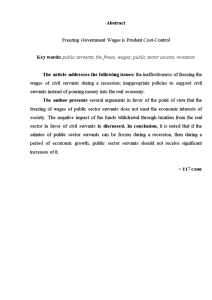Задание: Write an abstract of the article in English (115-125 words). Translate the 6-8th (highlighted) passages into Russian.
Freezing Government Wages is Prudent C’ost-Control
Manitoba's provincial government recently announced that in response to a looming $600
million deficit for this fiscal year, the province would freeze the wages of public sector employees for
the next two years. This was an entirely sensible decision. Manitoba's provincial public servants are
amongst the highest paid in the country. In fact, the average provincial level public administration
worker in Manitoba is paid 50 per cent more than the average worker in the economy. That compares
to a 35 per cent gap between provincial public servants and the average worker in Canada as a whole.
Facing a budget crisis, a pause in the growth of public sector salaries is a prudent cost-control measure.
The freeze announcement provoked protests from the leaders of public sector unions. This was
predictable because unions, like individuals, try to negotiate for the best deal possible from their
employers. Also, no one likes to see their wages frozen.
Union leaders shouldn't be blamed for being self-interested on wages—everyone is—but their
argument that a wage freeze would actually be harmful to the economy is inaccurate. Peter Olfert,
head of the Manitoba Government Employees Union, argues that freezing wages for public sector
workers would harm the economy as it would leave them with less disposable income, causing them
to spend less money and thereby prolong the recession.
Public sector unions all over the country make similar claims but it is important for
governments to recognize just how weak it is. The economic philosophy on which this argument is
based— Keynesianism— holds that governments should boost spending during recessions to
strengthen demand in the economy, and then scale it back during boom times. But has anyone ever
heard a union leader claim that wages should be frozen, or wage growth restrained during a period of
economic expansion? Of course not.
Instead, when the economy grows, we’re told that public servants deserve to share in the good
times, and should get big raises, just like everybody else. So the appropriate policy during both
recessions and booms is supposedly rapid public sector wage growth. It's a nice try, but it’s not
sensible economics.
6. The second point is that the money used to pay high public sector salaries bas to actually
come from somewhere. That “somewhere” is, of course, the private sector tax base.
7. Manitoba's public servants’ salaries have been rising faster than the Canadian average
for many years. As a result, the average annual wage for provincial public administration
workers in Manitoba is currently about $4,400 per year higher than the average for public
servants in neighbouring Saskatchewan. That’s the real reasons public salaries should be
stalled, recession or not. The additional taxes required to pay these high salaries inhibit
economic growth during recessions and in all other stages of the business cycle. Take money out
of the private economy through taxes to pay for high public sector salaries and there’s a negative
impact on consumer demand by reducing the spending power of taxpayers.
8. Lastly, even if one believes that increased government spending and large deficits should
be used to boost the economy during recessions, one struggles to think of a less effective and less
fair way to pump government money into the economy than through big raises to public sector
unions.
Some people are really hurt during recessions. If deficit spending is to be used to stimulate the
economy, it makes more sense to direct stimulus money to those in need rather than to government
workers who already enjoy secure, high-paying jobs. And if stimulative spending aimed at assisting
the middle-class is desired, it would be more fair to distribute it between all workers in the economy-
not just government union members- through a tax credit or a some similar instrument.
Governments’ responsibility during wage negotiations in good times and bad is the same: to
get the best possible deal for taxpayers.
' .
Аннотация на английском языке к тексту: Freezing Government Wages is Prudent C’ost-Control. Перевод абзацев 6, 7, 8. А также похожие готовые работы: Страница 5 #1509017
Артикул: 1509017
- Предмет: Английский язык
- Разместил(-а): 103 Егор в 2021 году
- Количество страниц: 3
- Формат файла: docx
499p.
Материалы, размещаемые в каталоге, с согласия автора, могут использоваться только в качестве дополнительного инструмента для решения имеющихся у вас задач,
сбора информации и источников, содержащих стороннее мнение по вопросу, его оценку, но не являются готовым решением.
Пользователь вправе по собственному усмотрению перерабатывать материалы, создавать производные произведения,
соглашаться или не соглашаться с выводами, предложенными автором, с его позицией.
| Тема: | Аннотация на английском языке к тексту: Freezing Government Wages is Prudent C’ost-Control. Перевод абзацев 6, 7, 8. |
| Артикул: | 1509017 |
| Дата написания: | 16.11.2021 |
| Тип работы: | Контрольная работа |
| Предмет: | Английский язык |
| Количество страниц: | 3 |
Файлы артикула: Аннотация на английском языке к тексту: Freezing Government Wages is Prudent C’ost-Control. Перевод абзацев 6, 7, 8. А также похожие готовые работы: Страница 5 по предмету английский язык
Abstract.docx
12.39 КБ
Перевод.docx
13.77 КБ
Пролистайте "Аннотация на английском языке к тексту: Freezing Government Wages is Prudent C’ost-Control. Перевод абзацев 6, 7, 8. А также похожие готовые работы: Страница 5" и убедитесь в качестве
После покупки артикул автоматически будет удален с сайта до 24.01.2025



Качество каждой готовой работы, представленной в каталоге, проверено и соответствует описанию. В случае обоснованных претензий мы гарантируем возврат денег в течение 24 часов.
Утром сдавать, а работа еще не написана?

Через 30 секунд после оплаты вы скачаете эту работу!
Сегодня уже купили 26 работ. Успей и ты забрать свою пока это не сделал кто-то другой!
ПРЕДЫДУЩАЯ РАБОТА
Раскрыть вопросы: 1. Взаимосвязь трех уровней психической деятельности человека: бессознательного, подсознательного, сознательного. 2. Характер...
СЛЕДУЮЩАЯ РАБОТА
Гимнастика

